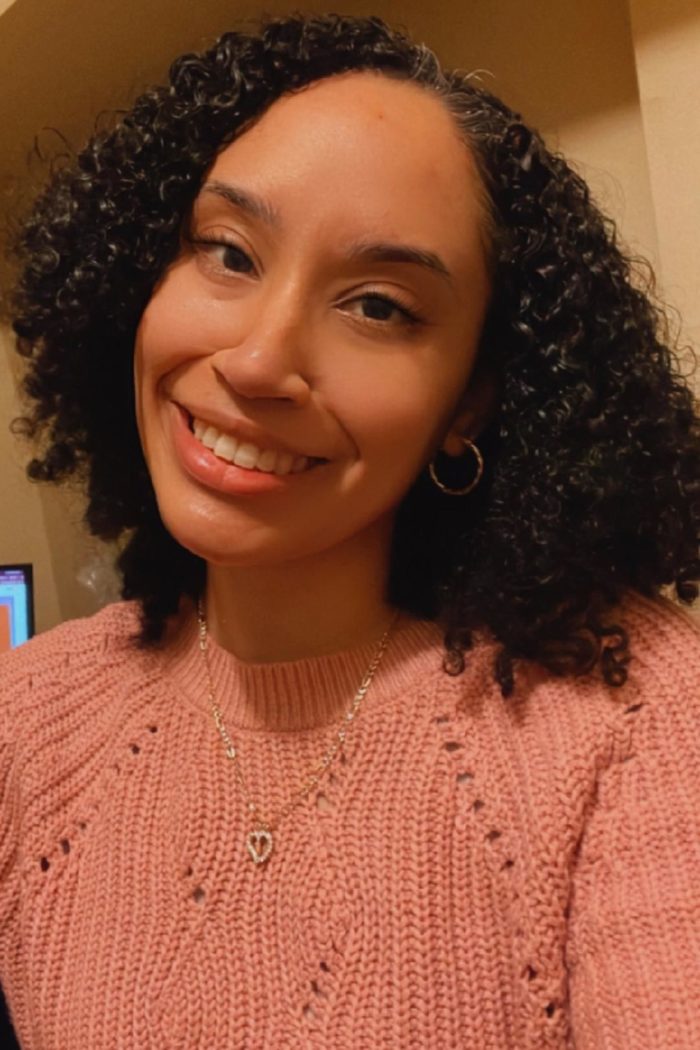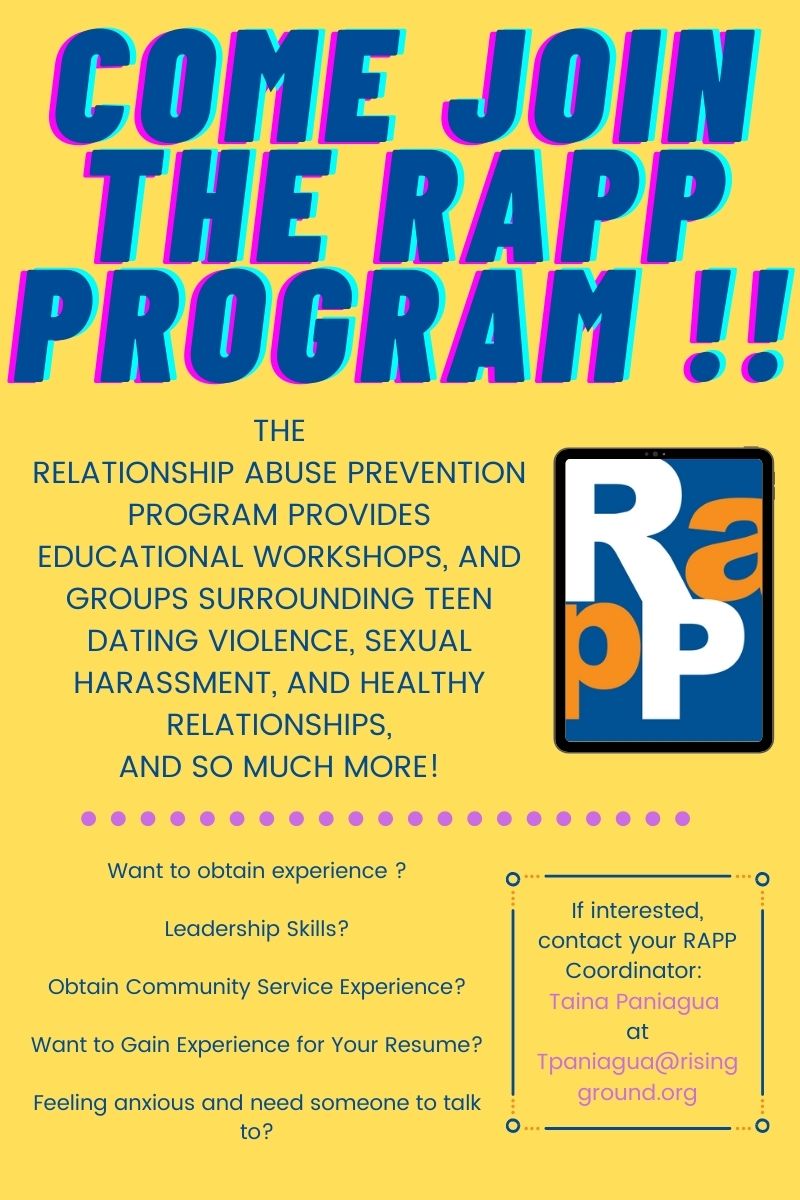By Ibne Tamim
Q: Please introduce yourself, and tell us what you do (your active role) in this student support group?
Taina: My name is Taina and I’m the RAPP coordinator at MCSM. RAPP stands for Relationship Abuse Prevention Program. I do workshops and therapy, and most importantly I’m here to offer resources and support for students. The RAPP program has existed at MCSM for 20 or more years. I started my job last year as a RAPP coordinator, and this is my first time at MCSM in person. RAPP Club is every Wednesday from 3:30 PM to 4:30 PM in the library.
Q: Why did you choose to lead this kind of group, and why is it significant to you?
Taina: I am a part of this program because I want to help people … and especially people who have been through trauma and who need [practical] support and resources. I think I can be that person who can support them. Part of why I’m here is so I can be helpful and spread awareness about relationship abuses, and be there for people in general who are struggling and in need some sort of support.
Q: Can you please tell us more about the RAPP club and why students should join this club?
Taina: People hear about “RAPP” and immediately think “Oh, but I’m not in an abusive relationship”, so they don’t think how that applies to them. But the thing is you don’t have to be in an abusive relationship or have experienced abuse in order to be in the RAPP club. Nine times out of ten we’ve all known somebody (or someone we know knows someone) who is in an abusive relationship. This is important to know, because if you’re informed about it, then you can pass down the message to somebody, and spread the awareness that can make a positive change in people’s lives.
Q: That is so true! And sometimes people don’t even realize that they are in an abusive relationship. Even if you point it out to them, some people refuse to believe it and are in denial that their relationship is harmful to them.
Taina: It’s a good thing you brought that up, because October is Domestic Violence Awareness Month. That means that we want to honor survivors of abuse. People often don’t think of themselves as victims, they think of themselves as survivors. It really depends on what someone has experienced and how they choose to identify. However, usually when we think of domestic violence, we think of a domestic partnership as people who are married and who live together. We want people to know that “relationship violence” can be all types of violence. They don’t have to be a married couple or live together to face partner violence. People are not just bad or good. We just have behaviors and actions that can be bad or good. We’re not defined by our behavior, we’re defined by our actions based on those behaviors. So when you realize that someone is doing something bad, even if it’s just a friend, you have to let them know what they’re doing and hold them accountable. We’re here to support people and make them realize what sort of situation they are in.
Q: What about people who are not the victim? People who are committing the abuse? Where do they fit in? Can they join the RAPP club too?
Taina: Absolutely. They can seek support too because we can unlearn things to be a better version of ourselves. Everyone is welcome to join the RAPP club.
Q: What is the purpose/mission of this club, and what do you guys value the most as a team?
Taina: The mission of this club is led by students, and for students. The club gives students the opportunity to come together, giving them a space to talk about anything they desire. We can talk about literally anything. And we want to give students an opportunity to feel like their voices matter, and to make the community they feel like. Students need an opportunity to express themselves freely without judgment, and that’s what the RAPP club is all about. The things we value the most are the fact that we can be vulnerable with each other, be honest, uplift one another and see the best in each other and make sure we hold ourselves accountable. We talk about how to support a friend. The first thing we teach is listening to people without judging. You give them their space and time to leave their partner. You have to believe your friend and help them get back in control of their life. We bring different kinds of conversations into the space to talk about. We talk about things like Black Lives Matter, and TV shows or movies that promote racial dynamics, what it is to be a woman in society, toxic masculinity, patriarchy, and other things that we hear all the time but don’t know what it is.
Q: Yes, I agree that a lot of people don’t know about the consequences and effects of toxic masculinity, gender biases, patriarchy, etc. I, myself don’t have a lot of knowledge about all the side effects of harmful relationship abuses like toxic masculinity, stereotyping, sexism, etc. Can you give us an example of some crisis a student might bring to RAPP to seek support from a sympathetic group in finding a solution?
Taina: It’s totally fine not to know about them. That’s why we are here—to help you guys learn about them. The thing is, toxic masculinity, patriarchy, racism, sexism, gender inequality … all of those things are literally tied together. And with a lot of these topics, these are things that have essentially shaped the way we come to conclusions, and the way that we think. We’ve all heard terms like “boys will be boys”, but where did you hear that? Often times if you ask someone where did they first heard it they’re kind of like “uhh I don’t know.” They just know that they’ve heard it and they have seen it, they just don’t know where. That’s how the society we live in has functioned. It has worked to kind of socialize us so that we show up in certain ways. It conditions the ways that we think, which informs our behavior. This is why we bring these types of conversations into our space, because it’s a really important way of revealing how we navigate our world. We want to dismantle a lot of these overarching systems that kind of don’t work in our favor. We have to understand how these little dynamics affect your day-to-day lives. We talk a lot about these topics, especially during our summer programs when we go more in-depth. We have guest speakers who come in and talk about these issues.
Q: So there is a RAPP summer program too? Can you please tell us more about the RAPP summer program?
Taina: For the summer sessions, students receive a stipend to participate in a seven-week program. It’s an in-person program from Monday to Thursday, starting at 10 AM and ending at 4 PM. It’s limited so we can’t accept every student. I get a lot of applicants from which I can take 4 students max—but if there is room in the budget we can hire more. We have a total of 60 adolescents who are coming from all NYC schools. We talk about capitalism, eco-feminism, misogyny, fatphobia, gender, and sexuality, the importance of pronouns and identity, the “four I’s” of oppression, and much more. Students are getting paid to learn about this, and we are also teaching them about public speaking and other skills like how to be a facilitator.
Q: Wow, you’re doing amazing work by being there for people who are struggling. Students at MCSM are lucky to have you as someone they can reach out to and seek help.

